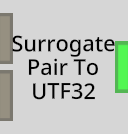Difference between revisions of "Surrogate Pair To UTF32 (LogiX node)"
Jump to navigation
Jump to search
(Created page with "<languages></languages> <translate> <!--T:1--> {{Infobox Logix Node | Name = Surrogate Pair To UTF32 | Image =File: SurrogatePairToUTF32Node.png | noframe | 128px | 'Surroga...") |
(Marked this version for translation) |
||
| Line 16: | Line 16: | ||
This node takes two characters as input and outputs a one-character string. | This node takes two characters as input and outputs a one-character string. | ||
| + | <!--T:6--> | ||
The <code>HighSurrogate</code> input must be a character within Unicode's High Surrogate set (<code>0xD800</code> to </code>0xDBFF</code>/) and the <code>LowSurrogate</code> input must be a character within Unicode's Low Surrogate set (<code>DC00</code> to <code>DFFF</code>). For a detailed explanation of how exactly surrogate pairs match to a UTF-16 codepoint, see [https://www.unicode.org/versions/Unicode3.0.0/ch03.pdf Unicode Version 3.0.0 Chapter 3], section 3.7, D28. | The <code>HighSurrogate</code> input must be a character within Unicode's High Surrogate set (<code>0xD800</code> to </code>0xDBFF</code>/) and the <code>LowSurrogate</code> input must be a character within Unicode's Low Surrogate set (<code>DC00</code> to <code>DFFF</code>). For a detailed explanation of how exactly surrogate pairs match to a UTF-16 codepoint, see [https://www.unicode.org/versions/Unicode3.0.0/ch03.pdf Unicode Version 3.0.0 Chapter 3], section 3.7, D28. | ||
| Line 21: | Line 22: | ||
In the following image, the high surrogate <code>55356</code> (<code>0xD83C</code>) and low surrogate <code>56621</code> (<code>0xDD2D</code>) are used to output the desired character, 🄭 (<code>U+1F12D</code>) | In the following image, the high surrogate <code>55356</code> (<code>0xD83C</code>) and low surrogate <code>56621</code> (<code>0xDD2D</code>) are used to output the desired character, 🄭 (<code>U+1F12D</code>) | ||
| + | <!--T:7--> | ||
[[File:Logix Example SurrogatePairToUTF32.png|600px]] | [[File:Logix Example SurrogatePairToUTF32.png|600px]] | ||
Revision as of 19:26, 11 September 2022
| Surrogate Pair To UTF32 | ||
|---|---|---|
 | ||
| Inputs | ||
| Char | HighSurrogate | |
| Char | LowSurrogate | |
| Outputs | ||
| Int | * | |
The Surrogate Pair To UTF32 node takes two characters within Unicode's Surrogate blocks and converts them to a UTF-32 character.
Usage
This node takes two characters as input and outputs a one-character string.
The HighSurrogate input must be a character within Unicode's High Surrogate set (0xD800 to 0xDBFF/) and the LowSurrogate input must be a character within Unicode's Low Surrogate set (DC00 to DFFF). For a detailed explanation of how exactly surrogate pairs match to a UTF-16 codepoint, see Unicode Version 3.0.0 Chapter 3, section 3.7, D28.
Examples
In the following image, the high surrogate 55356 (0xD83C) and low surrogate 56621 (0xDD2D) are used to output the desired character, 🄭 (U+1F12D)
